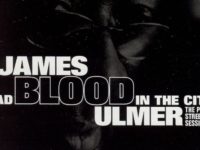Part Sonny Sharrock, part John Lee Hooker, James “Blood” Ulmer resides in his own unique space overlapping blues, whack jazz, straight jazz, rock, funk and a smattering of other forms. His ragged vocals and jagged guitar form a trademark weathered sound that’s sometimes calm, usually stormy and always unpredictable.
We tend to particularly like guitarists who can zig-zag around lines delineating styles of music, while remaining stubbornly themselves – and Ulmer fits that bill better than any other six-string maestro we’ve covered here. We particularly loved his Katrina-inspired Bad Blood in the City: The Piety Street Sessions, which capped off a nice little run of blues records that began with 2001’s Memphis Blood.
For his first release of the the new decade, James “Blood” Ulmer traversed nearly all the terrain he’s familiar with, both the conventional and unconventional. Issued on May 11, 2010, In and Out was titled in salute to a sturdy little record company out of Europe that’s welcomed cutting-edge artists like him, distributing Ulmer’s very first recording as a leader, 1977’s Revealing, and recording 1989’s Blues All Night shortly after the imprint was founded. In returning to In + Out Records, Ulmer clearly reveled in the artistic freedom this label provides.
He took only two companions on this free-range expedition, drummer Aubrey Dayle and bassist Mark Peterson. The stripped-down arrangement put their leader firmly in control of the tones and textures of In and Out, coming from the stiletto licks of Ulmer’s guitar, the quivering, anguished soul of his voice and for part of one song, even his flute. This was the complete James “Blood” Ulmer presentation.
“No Man’s Land” kicked off the collection on a rock note, but while Ulmer openly wondered why people are “fighting over this land” (the Middle East, perhaps?), his expressive and chordal-based acid tone at once recalling Jimi Hendrix and its casual distinction between chorus and verse recalling the real Delta Blues. “A Thing for Joe,” was combustible hard bop in a manner like tumbling down the stairs, and when Ulmer was done scatter-shooting notes, he picked up a flute and gave out more of the same manic mannerisms.
“Fat Mama” was even more explosive. He unleashed nearly two minutes of free-forming for an intro before the band moved into a funk groove and the blues was rendered, Hendrix-style. Ulmer played his licks in a familiar way, but then again that sharp tone and barely-contained attack put it in its own category. “Fat Mama” ends in the same open form way it began: That’s Ulmer’s way of combining whack jazz with the blues – and only he can do it so authoritatively.
“Eviction” was an about face into swing jazz, and Ulmer used the occasion to explore single-line note articulations. For “Baby Talk,” he got all harmolodic over African rhythms. “Maya” reached back stylistically to his R&B days of the ’60s, while “High Yellow” was undiluted walking-bass jazz highlighted by Ulmer’s fluid, tasty guitar expressions – again relying on single note lines to do the job. He returned to the same formula for the concluding “Backbiter,” but not before belting out another blues number, the solid-groovin‘ “I Believe In You.”
James “Blood” Ulmer once called this “the best damn record I ever made.” Of course, he’s made a lot of “damn good” records over the course of his career, but even a middling Ulmer record is worthy of many spins. This one stands out, because In and Out visited all the touch points that make Ulmer so complex and interesting. That’s why it remains such a great entry point for the curious.
- Ches Smith Quartet – ‘Clone Row’ (2025) - May 30, 2025
- James Brandon Lewis Quartet – ‘Abstraction Is Deliverance’ (2025) - May 27, 2025
- Soft Machine – ‘Drop’ (1971, 2025 remaster) - May 21, 2025




